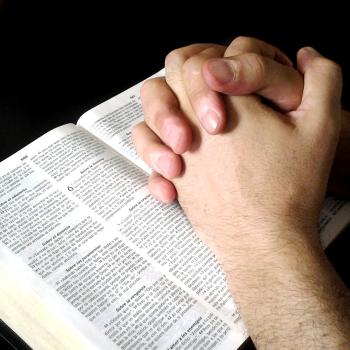To be honest, I have a certain amount of compassion for the Pharisees.

Image via Pixabay
They are the villains of the Gospels, selfish and self-righteous religious hypocrites who worked to have Jesus killed out of their own jealousies (see Mt 23; Mt 27.18).
When you say it like that, of course, they sound awful.
And in many ways they were; Jesus was right to challenge them and call out their toxic leadership and their duplicity and their theological errors.
Where I sympathize with them is that they really thought they were right about things. For biblical reasons.
They knew their Scripture. They knew it amazingly well, actually. They knew it front-to-back.
Their theology was well-thought-out and thorough.
Their devotion to the LORD was sincere.
Their commitment to their people was well-established.
In these ways, they sound a lot like what most Christ-followers would want to be.
And yet the Pharisees missed the Messiah that they were waiting for when He stood right in front of them.
Now to be certain, they also had many character issues of pride, self-righteousness, greed, and superiority (again, see Jesus’ rebukes in Matthew chapter 23).
These sin qualities easily interfere with our ability to see God clearly and understand His Word rightly.
And the Pharisees, blinded by themselves, were so committed to their specific interpretation of Scripture that they completely missed Jesus when He arrived.
Jesus didn’t look the way that they thought the Messiah should.
But here’s the thing:
Even though they turned out to be wrong, they had some reasonable biblical reasons to feel this way.
There are times where it really looks like Jesus is breaking God’s Law:
- Jesus allowed His disciples to do manual labour on the Sabbath (Mt 12.1-12), which was forbidden upon punishment by death (Ex 31.14-15).
- Jesus declared that the Old Testament dietary laws calling certain foods “unclean” (Lev 11) were now to be superseded by Him declaring “all foods clean” (Mk 7.17-19).
- Jesus told the paralytic man that He healed to carry a load on the Sabbath (Jn 5.1-15), which was forbidden (Jer 17.21).
- Jesus approached and touched a leper (Mt 8.1-3), when the Law required isolation (Lev 13.46).
- Jesus didn’t condemn the woman caught in adultery to death (Jn 8.1-11), as the Law commanded (Lev 20.10).
- And most importantly and most grievously to the Pharisees, Jesus claimed to be God Himself (Jn 5.17-18; 8.58), which would eventually be what caused them to seek His death. They expected a Messiah, but not a God-man. It was blasphemy to their ears for a human to claim divinity, and thus Jesus required the death penalty in their eyes (Lev 24.15-16; Mk 14.61-65).
So did Jesus really break God’s Law?
No.
It’s not possible, and the idea would be considered heresy amongst orthodox Christians, of which I am one (2Cor 5.21, 1 Pet 2.22, Heb 4.15).
But that theological belief in His perfect obedience to the Law still requires some wrestling, in light of these examples where it appears Jesus may have laid aside God’s Word.
So there are a few simple enough ways to navigate these tensions:
- First, Jesus as God is both the Lawgiver and the Judge (Jn 5.22; Ac 10;42; Jam 4.12; etc.). As such, He is the only one who interprets the Law perfectly and who has the right to judge people by it; it is His Law! In this role, He has the right to make His will regarding His commandments perfectly clear to human understanding, such as when He called Himself “Lord of the Sabbath” and expounded upon work that is allowed on the Sabbath (Mt 12.8; v. 12). As Lord, He is the only one who decrees the proper understanding and application of His own Law, so there is no contradiction when He gives clear instruction on proper Sabbath etiquette. Jesus is the living Word of God (Jn 1.1), and so His life is the perfect reflection of the perfect application of God’s will as revealed by Scripture.
- Second, in cases like Jesus declaring all foods clean, or more importantly, revealing that He was God, these were indeed new revelations, which, although they seemed to contradict the Law, were simply the fullness of the revelation of God that was always intended to eventually come to the world. The Law was always just a temporary placeholder until Christ came (Gal 3.23-25); part of what Jesus taught was what the fullness of the Kingdom was to look like, which included some new revelation that God wanted the world to know. The Law and the Prophets was stage one of God’s message to the world; Jesus was the final stage, bringing the whole picture of God’s revelation to the world (Heb 1.1-3).
- Third, at times, Jesus laid aside the harshness of the penalties of the Law in the name of His mercy, such as drawing near to the leper or forgiving the woman caught in adultery. God treated King David’s sin similarly; although by the Law, David deserved death for his sins, God forgave his sin instead (2Sam 12.13). God is just, but also merciful, and at times in the name of mercy, He does not treat us as our sins deserve according to the Law (Ps 103.10). This does not need to be considered paradoxical to His nature or His Word, as His nature and His Word also highlight His mercy, forgiveness, and grace.
When Jesus arrived on earth, He said that He had come to fulfill the Law in its fullness (Mt 5.17). Although His death on the cross would bring an end to the Law’s rule over our lives (Rom 7), we believe that Jesus lived out God’s will perfectly when He lived on earth, and showed us the fullness of who our God is and how we are to live before Him (Col 1.15; Heb 1.1-4).
The Scriptures are the Word of God infallibly recorded in writing; Jesus is the Word of God infallibly lived out in real life.
The Pharisees were unable to get past the seeming contradictions between their view of the Word and the Jesus that they saw.
In a way, this is understandable, and perhaps even relatable.
But it should also remind us that we too don’t see all things perfectly either, and we should seek the Lord’s truth and revelation in such a way that we do not confine Him to our preconceived theological convictions, lest we miss His work because we are not open to what we may not understand.
********
If you’ve enjoyed what you read here, you can follow Third Way Christians on Facebook or Instagram, or sign up here to get new columns emailed directly to you! As well, you can track along with Chris’ Sunday morning teaching at Meadow Brook Church’s YouTube page!












